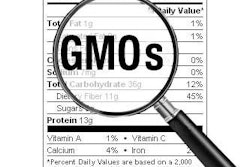
Anti-biotechnology activists are advocating mandatory GMO labeling, which reminds one food industry observer of past campaigns to promote easily misunderstood labels that alarm consumers. John W. Bode, president and CEO of the Corn Refiners Association, urges the government to understand how consumers read labels to ensure that labels are both truthful and non-misleading. Bode voiced his concerns in a Forbes opinion piece.
The Food and Drug Administration (FDA) initially proposed no labeling requirement for irradiated products, but anti-technology activists mounted a huge campaign for a “Treated by Irradiation” and display of the international radura symbol, which looks like an upside down mushroom cloud. FDA gave in and the labeling requirement was imposed. Consumer research told food marketers that products with that label simply would not sell. Now, irradiation is used significantly in the food industry, but only in circumstances where the labeling requirement would not be triggered.
What FDA lost sight of then and we should not lose sight of again, Bode writes, is that label statements may be truthful, but misleading. Consumers perceived the irradiation label statement to be a warning. They were so badly misled by a government-mandated label statement that an affordable life-saving technology was ignored amid a crisis so great that it transformed operations in substantial parts of the food industry and required a public education campaign to teach Americans that hamburgers must be cooked all the way through.
Today, anti-biotechnology activists are advocating GMO labeling. They know that they can’t prevail by directly opposing agricultural biotechnology. The benefits are simply too large. Instead, they are advocating “consumer right to know” labeling that is intended to scare consumers. They are well-funded by elements of the organic food industry. Why are some organic food industry interests involved? Money. If they can force a pejorative label onto the products of their competitors, organic sales volume will surge.
When we hear the “consumer right to know” argument, the question ought to be whether the labeling proposed is informing consumers of a significant fact about a product or, perhaps, an attempt to impose a pejorative label statement that misleads consumers, Bode notes. The way to answer that question is simple, but shamefully absent from government decision-making.
The starting point for all food labeling government actions should be a high-quality consumer perception study to determine what consumers think the proposed label statement means. Such surveys are quick and affordable. In development of a regulatory labeling definition, starting with consumer understanding of the term is the simple path to clear communication. This all sounds quite obvious, but it is light years from how food labeling policy is now developed.
To read more, click here.



















